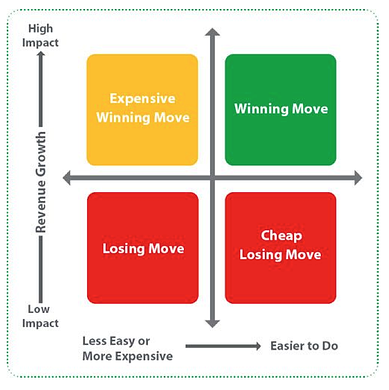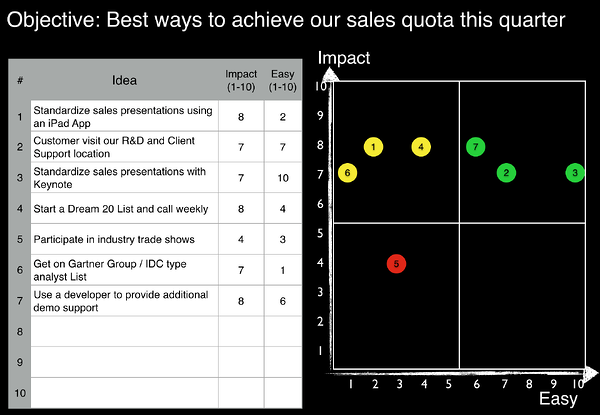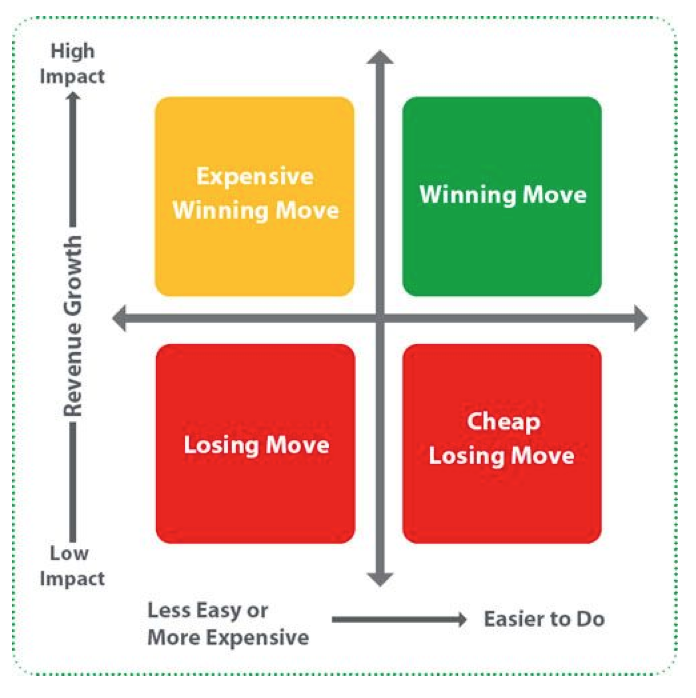A new quarter is starting. It is time to discuss, prioritize and choose your top priorities for the new quarter. How do you do this? How do you decide what are the best ideas and priorities to execute?
Prioritizing is not about ranking from 1 to 10 and doing them all (or failing to do the last few). Rather, prioritizing is about focusing on your business's most critical areas. To achieve focus, you need a few big things to focus on, not a list of 10 things to try and get to. As Yoda in Star Wars said, "Try not. Do... or do not. There is no try." Trying to work on all ten things does not give you focus. You're saying "No" to items 4 through 10 frees your brain to focus on your top 3 priorities.
So what are the right two to three things to determine your priority areas for the next quarter for appraisal? In chapter 2 of my book, Rhythm, I discuss using an objective and straightforward way to sort through ideas and choose the right ideas to build winning strategies. It is an objective framework to discuss subjective ideas and to keep our discussions and decisions from becoming too emotional. Your best ideas are the ones that will give you the most substantial revenue growth for a minor investment of resources. Use our SMART AI goal coach if you need help to come up with some ideas, then use a simple framework with two questions to rate each idea:
- What is the impact on your revenue growth over the next three to five years? Rate it from 1 to 10, with 10 being the highest impact.
- How easy is it for your team to execute on this idea? By "easy," I mean, can it be implemented with current resources? Will it require little additional capital? Is it synergistic with other projects? Rate it from 1 to 10. The more difficult or expensive it is to develop and execute, the lower the rating. This means one is the least easy, and ten is the easiest.
Once you've scored your potential moves, plot them on the four-quadrant winning moves chart below. Applying the same scale of Impact and Easy to Rate all your ideas is very important. This provides a consistent and objective framework to discuss and choose the right ideas to execute.

So let's apply this to choosing the right priorities for a winning quarter!
Areas of Impact: how are you making an impact? Consider your priorities
You can apply this same method to help you prioritize and choose short-term goals and priorities as well. Many of our clients use this method as a framework to discuss and decide on their top priorities for the quarter.
Over the last decade, we have facilitated thousands of quarterly planning sessions for clients using this framework with remarkable success. Success, in this case, meant the following:
- The companies chose their top 3 ideas from a list of more than 10 to 20 ideas.
- They enjoyed the process. Different opinions were discussed openly and objectively. There were no losers in the discussions. Only the ideas that were not chosen were lost. All the humans were safe!
- Every team member was excited and bought into the top 3 ideas. In other words, they achieved alignment.
- They were confident that they were about to embark on a winning quarter.
Here's how to use this framework for choosing priorities for your quarter.
Step 1: Begin with the end in mind. What problem or opportunity would you like to focus on?
Step 2: Brainstorm or collect the ideas and potential priorities.
- Five minutes: Start with independent work. Each person should write down his or her ideas.
- Twenty minutes: Now, as a team, discuss the ideas. Narrow the list down to the top 10 ideas. Use a voting process. Give each person 3 votes. Count up the votes and narrow your ideas down to the top 10.
Step 3: Rank your Top 10 and view them in the four quadrants.
- Rate the Impact of each idea.
- Rate how easy it is to implement.
- Plot it on the 4-quadrant chart (Or, as one client says, "4 block it!"). Your rating and plot on the 4-quadrant chart should look something like the example below:

Step 4: Discuss, debate, and agree.
When you choose your top 3 ideas, you can use the chart to help you. But, it does not mean you should automatically choose the High Impact and Easiest ideas (Top right quadrant). This is an objective framework to guide your discussions and decision. But charts don't make decisions; people do. There may be solid and strategic reasons to go after an idea in the top left quadrant - The High Impact and Less Easy quadrant. You can't afford many of these because they take more effort or resources. Consider these High Impact Less Easy ideas when they give you a strategic advantage against your competition.
Priorities for next quarter examples:
- Cascade KPI Alignment: Let's get all hands rowing in the same direction this quarter! Like a fine symphony, every section must be in tune and play the same piece. Aligning Key Performance Indicators (KPIs) across all levels of the organization ensures that everyone knows how their role contributes to the big picture, maximizing our chances of hitting our numbers.
- Strategic Plan Renewal: Our strategic plan is like a treasure map guiding us to the promised land of success! It's time to breathe new life into our 3-5 year plan. A lot can change in a year, so let's revisit, revise and reinvigorate our roadmap to ensure it reflects the present reality and future aspirations. As the compass of our journey, keeping it current is vital.
- Rev Up the Sales Engine Training: Full steam ahead! If we want to conquer new horizons, we must ensure that our sales team has the tools and skills to navigate the stormy seas of the market. This quarter, let's invest in their training to boost revenue by 15% next year. An empowered and equipped sales team is like a mighty ship that will carry us to uncharted waters of prosperity.
- Innovation Sprint Challenge: Remember, if you are not innovating, you stagnate! Set aside time this quarter for a focused innovation sprint. Encourage teams to brainstorm, prototype, and pitch ideas that could pave the way for breakthroughs. It's time to channel our inner Edisons and create lightbulb moments that move the needle!
- Supercharge The Talent Pipeline: Our people are our most precious resource, and like rare diamonds, it takes time to find and polish them. This quarter, let's get strategic about talent acquisition and development. Engage in proactive recruitment, create mentorship programs, and ensure every employee has a growth path. As the engine of our company, when our people thrive, we thrive!
- Highway to Web Traffic: Zoom, zoom! Let's put the pedal to the metal and speed up our website traffic by 20%. Content is king, and SEO is the horsepower in our engine. Let's revamp our content strategy this quarter and supercharge our SEO efforts. We're on a highway to growth, and there's no looking back!
- Unveil the Next Big Thing: It's time to pull back the curtain and reveal our next showstopper – a new product line or service! Innovation is the lifeblood of our business. Introducing something fresh to our portfolio gives our customers more ways to engage with us. We're not just building a product; we're building an experience!
- Customer Satisfaction Rocket Boost: We're not just aiming for the stars; we want to make our customers feel like stars! Elevating customer satisfaction ratings by 15% is the mission. A happy customer is our best brand ambassador. Personalized service, prompt responses, and delight in every interaction will rocket us to new heights!
- Chart New Territories: It's time to hoist the sails and set course for uncharted markets! Expanding our market share by targeting new demographics or geographic areas is the adventure we need. Understanding their needs and crafting tailor-made solutions will help us build bridges to new opportunities. Here's to conquering new lands!
- Lead Generation Power-Up: Social media is our treasure trove, and we're on a quest to uncover 50 golden leads! Crafting compelling campaigns that resonate with our audience will be the key. Each like, share, and comment gets us closer to unearthing the treasure. Avast ye, social media success ahoy!
- Email Open Rate Elevation: Let's bring some electricity to our email campaigns! We'll tap into precision's power by boosting open rates by 10% through A/B testing and refining strategies. It's about delivering the right message, to the right person, at the right time. Email isn't just communication; it's a connection!
- Conversion Rate Optimization Crusade: We've got the traffic; let's turn it into treasure! Increasing conversion rates by 15% ensures every visitor sees our value. With optimized website design and a seamless user experience, we're not just making a sale; we're forging a partnership!
Choose well. Say "No" to the rest, and have a great Winning Quarter! Suppose you don't know where to start. In that case, you can download our quarterly planning agenda or see if hiring a strategic facilitator makes sense to help you align your quarterly priorities and long-term strategy.
Question areas of impact: How are you making an impact? Consider your priorities. If you have ideas for significant priority areas for next quarter, please share them in the comments; we'd love to hear from you!
Want to learn more about Quarterly Planning? Check out these additional quarterly planning resources:
Value of Outside Facilitation for Quarterly and Annual Planning
The Anatomy of a Great Quarterly Plan (Infographic)
Lean Quarterly Planning: How Complex Companies Drive Out Waste
10 Tips for a Successful Quarterly Planning Session (Video)
Tips to Help You Prepare to Facilitate Your Next One-Day Quarterly Planning Session
How Much Time Should I Allocate for My Quarterly Planning Session?
The Definitive Guide to Quarterly Planning
Rhythm Systems Quarterly Planning Resource Center
Photo Credit: iStock by Getty Images



 LinkedIn
LinkedIn
 Facebook
Facebook

